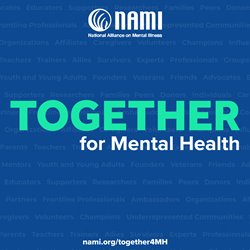When it comes to our health we often think about our physical health and all the aches, pains, and different things our bodies surprise us with. Yet sometimes we neglect other huge pieces of the overall total health puzzle: our mental health. Mental health is just as important a piece of this puzzle as it can be a determining factor in how we best handle our physical health. Mental health is unique in its ability to hide away its symptoms and concerns more easily whereas physical ailments can be much more visible and literal. May is Mental Health Awareness Month, but in reality, every day is a chance to be mental health day.
According to www.mentalhealth.gov mental health, “includes our emotional, psychological, and social welfare. It affects how we think, feel, and act. It also helps determine how we handle stress, relate to others, and make choices. Mental health is important at every stage of life, from childhood and adolescence through adulthood.” This means that there’s no denying that every thought, feeling, and reaction is a real reflection of where we are at with our mental health. Just like physical health it can also ebb and flow, you can have some days where things seem to be great and other days where they seem not so great. It’s when those, “not so great” days start to increase and steal joy and quality from your life that makes them cause for concern.
Mental health isn’t like our regular physical health where we typically check in once a year with a healthcare professional. There is no “one way” to seek support and guidance from a mental health professional. Unfortunately, somewhere along the way, people started to create this stigma about working with mental health professionals and it is just wrong. If you work out with a personal trainer on your physical health, why wouldn’t you do the same for your mental health? Luckily awareness of that stigma is slowly breaking down. In 2019, The American Psychological Association says, “a telephone survey of 1,000 randomly selected Americans between the ages of 18 and 64 shows that stigma about seeking mental health treatment is increasingly less of an obstacle to getting treatment.” Russ Newman, Ph.D., JD, APA’s executive director for professional practice, says, “We’ve made progress in people’s attitudes toward getting mental health treatment or seeking it for their loved ones.”
How do you know if you need extra support? Everyone can benefit from regular mental health support, including therapy and other mental health opportunities, but something we just need more. Chances are if you are going through something traumatic, have experienced trauma in the past, and/or have a family history with mental health concerns, you would benefit from accessing a therapist or mental health counselor. They will be able to help you best assess where you are at and plan how to move forward. One of the positives that Covid-19 brought, was the access to virtual telehealth therapy and other specialty services that we might not have in our area. If you are experiencing changes in your sleeping, eating or interest in activities that can be a sign something is up. If you have no energy and are just “numb” to situations that would have produced some type of reaction or emotion in the past that can also be telling. Mood swings that seem larger than ever and are impacting your relationships, career, or daily life are also a sign that you may need some extra support. If you can’t shake memories or thoughts that you know aren’t healthy, that’s a sign too. Anyone who is feeling helpless or hopeless is also our body’s way of letting us know it’s time for help. Just like a physical symptom that isn’t going away or is persistent, it’s time to get help.
Along with feeling helpless or hopeless, any time you are having thoughts of hurting yourself or others it’s time to get help. Just like we can’t control everything our bodies do, we also can’t control our brains. Mental health issues are non-discriminatory! Depression doesn’t only affect “some people,” it can affect all people! There are so many new therapies and treatments today that can help in a variety of ways. If you thought you were having a heart attack you would get to the hospital, right? That same rule goes for thoughts of harm. It’s a sign you need help and there are so many wonderful people in our community who can help you!
Where to start? Depending on what you are experiencing you can always talk to your healthcare professional for a referral to a therapist or support group. Your physician may even suggest some treatment as well or the mental health services out of NC Primary Care-Newport or Barton/Orleans. You can also always call Northeast Kingdom Human Services where it is their mission to support the mental health and mental wellness of the community. You can call them for general information at (802) 334-6744/ 800-696-4979. For emergencies, it is best to always just call 911. The same goes for family or friends if you have an immediate concern, calling 911 is always the best default if you fear for their safety.
When we are aware of our own mental health and how we typically think, act and feel, we can better manage when things aren’t feeling that right. We can also be empathetic to all of those around us who could be dealing with their own mental health concerns. Just as everyone deserves to have great care for physical health, we all deserve and need that for our mental health as well. Each and every day is a chance to embrace working towards a healthier mental state of being. Let’s not only raise awareness this month for mental health but every day because every day is a chance to be mental health day.
Mary Hoadley
Director OF The Wellness Center


